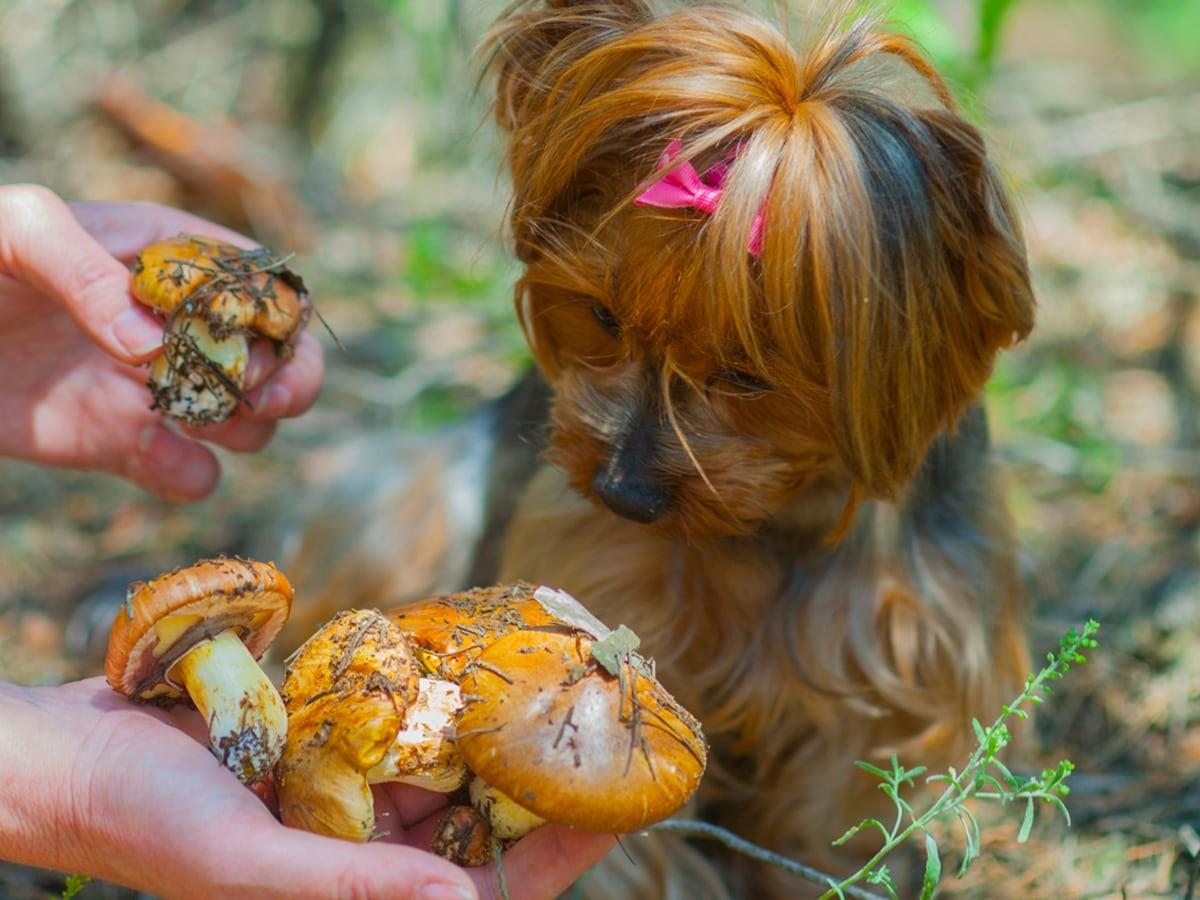While we might enjoy adding mushrooms to our favorite dishes, it's essential to be cautious when it comes to our canine companions. Can dogs eat mushrooms? The answer is: it depends. Understanding which mushrooms are safe and which are toxic is crucial for responsible dog ownership.
Which Mushrooms Are Safe for Dogs?
A few commonly cultivated mushroom varieties are generally considered non-toxic for dogs. These include:
White Button Mushrooms
Cremini Mushrooms
Portobello Mushrooms
Shiitake Mushrooms
Maitake Mushrooms
Reishi Mushrooms
These mushrooms should be offered in moderation and only as occasional treats; they should not be a staple in your dog's diet. Always consult with your veterinarian before introducing new foods, especially if your dog has any underlying health conditions.
What Kind of Mushrooms Are Good for Dogs?
Beyond just being "safe," some mushrooms offer potential health benefits for dogs. These medicinal mushrooms are often available in supplement form or as powders that can be added to your dog's food:
Shiitake: Known for immune-boosting properties and supporting liver health.
Maitake: May help regulate blood sugar levels and support immune function.
Reishi: Adaptogenic properties may help with stress and anxiety in dogs.
Turkey Tail: Contains compounds that may fight cancer cells and boost the immune system.
Cordyceps: May improve energy levels and stamina.
Chaga: Rich in antioxidants and may have anti-inflammatory effects.
It's crucial to consult your veterinarian before adding any medicinal mushrooms to your dog's diet, as they can interact with certain medications or health conditions.
Benefits of Dog-Safe Mushrooms
When offered in moderation, safe mushrooms can provide additional nutritional value to your pet. They offer:
Additional vitamins, minerals, and antioxidants
Fiber content that supports digestive health
Potential immune-boosting properties
Which Mushrooms Are Dangerous for Dogs?
Many wild and cultivated mushroom species pose severe toxicity risks to dogs. Some of the most dangerous include:
Amanita species (Death Caps, Destroying Angels)
Galerina species
Lepiota species
False Morels
Certain Inocybe and Clitocybe species
Why Are Some Mushrooms Toxic to Dogs?
Toxic mushrooms contain various harmful compounds that can affect dogs differently. Some common toxins include:
Amatoxins: Found in Amanita mushrooms, these toxins cause gastrointestinal symptoms; sometimes dogs can seem to feel better only for liver failure, acute kidney damage, and death to follow. Other Amanita-type mushrooms can cause tremors, seizures, and sedation.
Muscarine: Present in certain Inocybe and Clitocybe species, it affects the nervous system, leading to excessive salivation, teary eyes, and urination as well as diarrhea and neurological symptoms.
Gyromitrin: Found in False Morels, it can cause vomiting and diarrhea, but ingestion of these mushrooms is normally not fatal.
These toxins can have rapid and severe effects on a dog's body, so immediate veterinary attention is critical if you suspect your dog has eaten a poisonous mushroom.
Symptoms of Mushroom Poisoning in Dogs
Initial signs of mushroom toxicity might include:
Vomiting
Lethargy
Weakness
More severe poisoning can manifest as:
Jaundice (yellowing of skin and eyes)
Seizures
Discolored urine
Coma
What Should I Do If My Dog Ate a Poisonous Mushroom?
If you suspect that your dog has ingested a poisonous mushroom, seek veterinary care immediately. Early treatment can help to prevent serious health complications and can save your dog's life.
Here are some steps you can take if your dog eats a poisonous mushroom:
Contact your vet: Call your vet or an animal poison control center as soon as possible. Provide as much information as you can about the mushroom your dog ingested, including the size, color, and shape of the mushroom, as well as the time of ingestion and any symptoms your dog may be experiencing.
Observe your dog: Keep a close eye on your dog and watch for any signs of illness or distress. Symptoms of mushroom poisoning in dogs can include vomiting, diarrhea, lethargy, abdominal pain, jaundice, seizures, and coma.
Do not induce vomiting: Do not try to induce vomiting in your dog unless directed to do so by a vet. In some cases, inducing vomiting can worsen the situation and cause further harm to your dog.
Bring a sample of the mushroom: If possible, bring a sample of the mushroom your dog ingested to the vet. This can help to identify the type of mushroom and determine the appropriate treatment.
Follow your vet's instructions: Your vet may recommend treatment options such as IV fluids, activated charcoal, anti-nausea medications, and supportive care. Follow your vet's instructions carefully and provide any necessary follow-up care or medication as directed.
It is important to note that prevention is the best way to protect your dog from mushroom poisoning. Keep your dog on a leash when out for walks, keep your yard free of mushrooms, and be vigilant when camping or hiking in areas where mushrooms may grow.
How to Cook Mushrooms for Dogs?
While some store-bought mushrooms can be fed raw to dogs, cooking them can make them easier to digest. Here's how to prepare mushrooms for your dog:
Clean Thoroughly: Wash the mushrooms to remove any dirt or debris.
Chop into Small Pieces: Cut the mushrooms into bite-sized pieces to prevent choking hazards.
Cook Plain: Avoid using any oils, butter, or seasonings, as these can be harmful to dogs.
Methods: Steam, bake, or sauté the mushrooms until they are soft and cooked through. You can also add them to bone broth and slow cook for a long time to enhance the flavor and nutritional value.
Remember, cooked mushrooms should only be given as an occasional treat and not as a significant part of your dog's diet.
FAQ: Mushrooms and Dogs
Can my dog eat store-bought mushrooms? Generally, yes, stick to the varieties listed as safe. Always wash them thoroughly.
How much mushroom is toxic to dogs? Toxicity depends on the mushroom species, amount ingested, and the dog's size and health. Any amount of a potentially toxic mushroom warrants immediate veterinary consultation.
Can dogs eat cooked mushrooms? Yes, cooked mushrooms are generally easier for dogs to digest. Ensure they are cooked plain without any harmful seasonings.
Which mushrooms are safe for dogs? Only the cultivated varieties listed earlier should be considered, and only with veterinary guidance.
Can dogs eat white mushrooms? White button mushrooms from the grocery store are generally safe in moderation.
Expert Insights From Spot
As much as we love to share our favorite foods with our pets, it's important to remember that not all human foods are safe for dogs. Spot's internal data shows that pet insurance claims for dietary indiscretions in pets average $642*, underscoring the importance of caution and research before sharing snacks with our pets.
Conclusion
Mushroom safety for dogs is complex. While a few common store-bought varieties are generally safe, many others pose serious risks. Never allow your dog to consume wild mushrooms. If mushroom poisoning is suspected, take your pet to the vet immediately. When in doubt, always prioritize your dog's health by choosing safe, dog-approved treats. And remember to consult your veterinarian before introducing any new foods, including mushrooms, into your dog's diet.

Mostly a tech person, always a pet person. I am dedicated to improving the lives of pets and their humans with technology. Off-duty, I enjoy writing about the misbehaving of computer programs and my two Aussiedoodles, Calvin and Hobbes.
*Jan 2019 to April 2024 administrator claims data
Can Dogs Eat Mushrooms? Why These Fungi Can Be Dangerous. (n.d.). In American Kennel Club. Retrieved October 4, 2024, from https://www.akc.org/expert-advice/nutrition/can-dogs-eat-mushrooms/
Medicinal Mushrooms For Dogs. (n.d.). In www.petmd.com. Retrieved October 4, 2024, from https://www.petmd.com/dog/general-health/medicinal-mushrooms-for-dogs
Real Mushrooms. (2022). Can Dogs Eat Cooked Mushrooms? Facts, Benefits, And 3 Recipes. In Real Mushrooms. https://www.realmushrooms.com/can-dogs-eat-cooked-mushrooms/
The information presented in this article is for educational and informational purposes only and does not constitute or substitute for the advice of your veterinarian.












